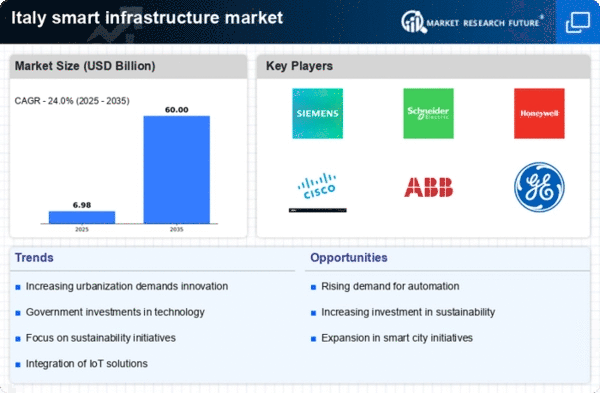Government Initiatives and Funding
The Italian government actively promotes the smart infrastructure market through various initiatives and funding programs. These efforts aim to enhance urban development and improve public services. For instance, the National Recovery and Resilience Plan allocates substantial financial resources to digitalize infrastructure, which is expected to reach approximately €200 billion by 2026. This funding is likely to stimulate innovation and attract private investments, thereby fostering growth in the smart infrastructure market. Furthermore, the government's commitment to achieving carbon neutrality by 2050 encourages the adoption of smart technologies that optimize energy consumption and reduce emissions. As a result, the smart infrastructure market in Italy is poised for significant expansion, driven by supportive policies and financial backing.
Urbanization and Population Growth
Italy's ongoing urbanization and population growth are pivotal drivers of the smart infrastructure market. With over 70% of the population residing in urban areas, cities face increasing pressure on infrastructure and services. This trend necessitates the implementation of smart solutions to enhance efficiency and sustainability. The smart infrastructure market is projected to grow at a CAGR of around 15% over the next five years, largely fueled by the demand for smart transportation systems, waste management, and energy-efficient buildings. Urban planners and local governments are increasingly investing in smart technologies to address challenges such as traffic congestion, pollution, and resource management. Consequently, the smart infrastructure market is likely to thrive as cities adapt to the needs of their growing populations.
Technological Advancements in Infrastructure
Rapid technological advancements are reshaping the smart infrastructure market in Italy. Innovations in artificial intelligence, big data analytics, and the Internet of Things (IoT) are enabling the development of more efficient and responsive infrastructure systems. For example, smart traffic management systems utilize real-time data to optimize traffic flow, reducing congestion and emissions. The integration of these technologies is expected to enhance the overall quality of life for citizens while also improving operational efficiency for municipalities. The smart infrastructure market is anticipated to witness a surge in demand for these advanced solutions, with investments in smart city projects projected to exceed €10 billion by 2025. This trend indicates a robust growth trajectory for the smart infrastructure market as technology continues to evolve.
Public Awareness and Demand for Smart Solutions
There is a growing public awareness and demand for smart solutions in Italy, which significantly impacts the smart infrastructure market. Citizens are increasingly recognizing the benefits of smart technologies, such as improved energy efficiency, enhanced public safety, and better quality of life. This shift in consumer preferences is prompting local governments and businesses to invest in smart infrastructure projects. Surveys indicate that approximately 65% of Italians support the implementation of smart city initiatives, reflecting a strong desire for modernized urban environments. As public demand for smart solutions continues to rise, the smart infrastructure market is likely to expand, driven by the need for innovative and sustainable urban development.
Collaboration Between Public and Private Sectors
Collaboration between public and private sectors is emerging as a crucial driver of the smart infrastructure market in Italy. Partnerships between government entities and private companies facilitate the sharing of resources, expertise, and technology, leading to more effective implementation of smart infrastructure projects. This collaborative approach is evident in various initiatives, such as public-private partnerships (PPPs) aimed at developing smart transportation systems and energy-efficient buildings. The Italian government encourages these partnerships by providing incentives and regulatory support, which can enhance project feasibility and attract investment. As a result, the smart infrastructure market is likely to benefit from increased innovation and efficiency, positioning Italy as a leader in smart infrastructure development.
















